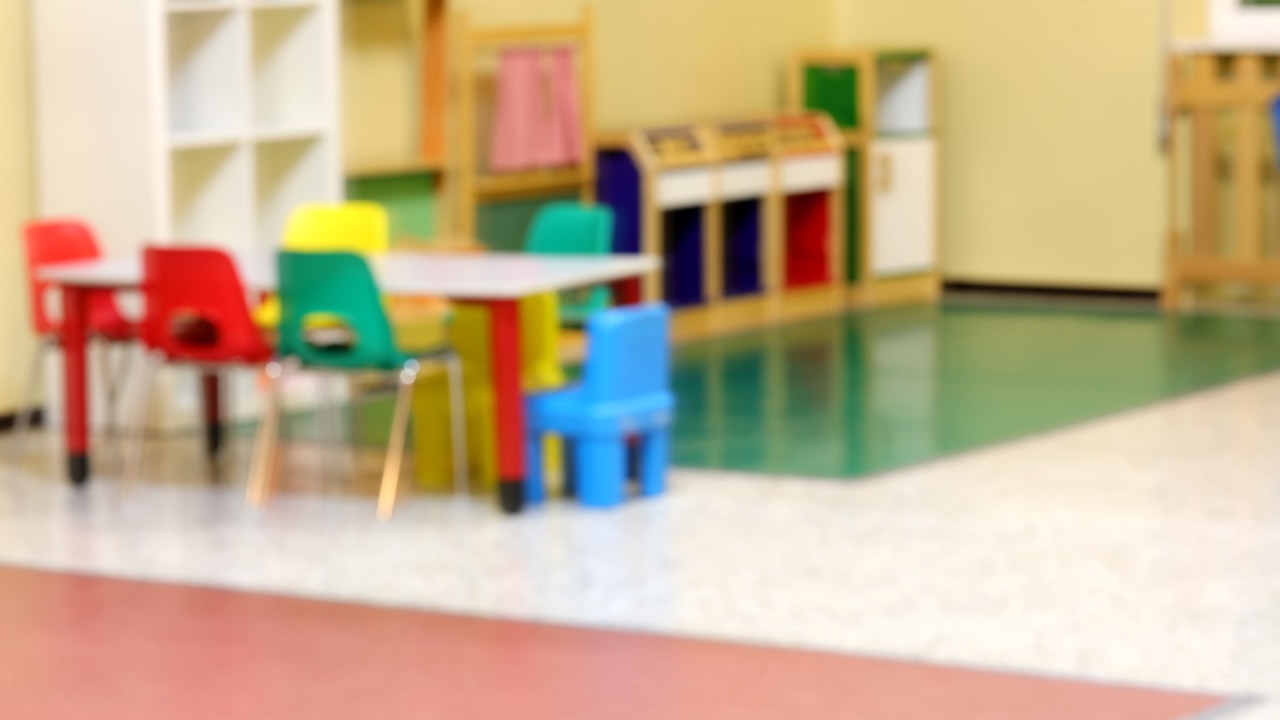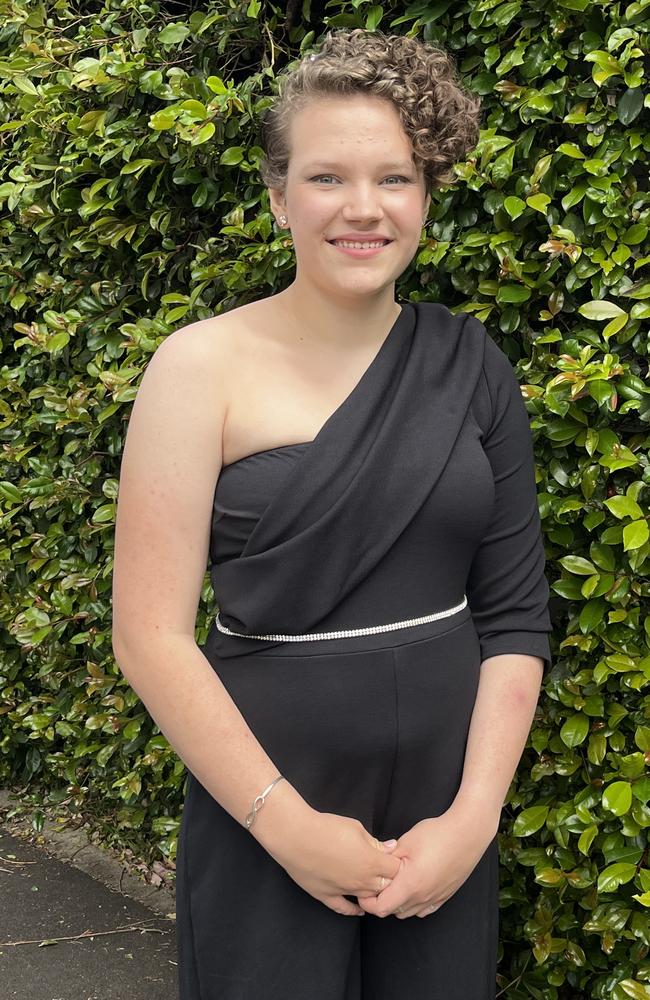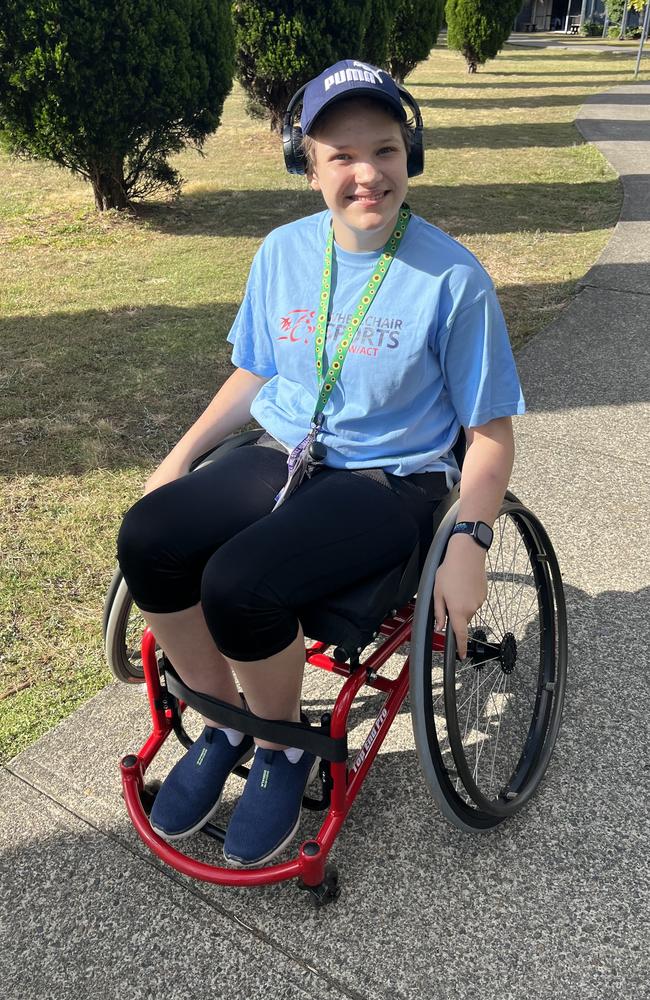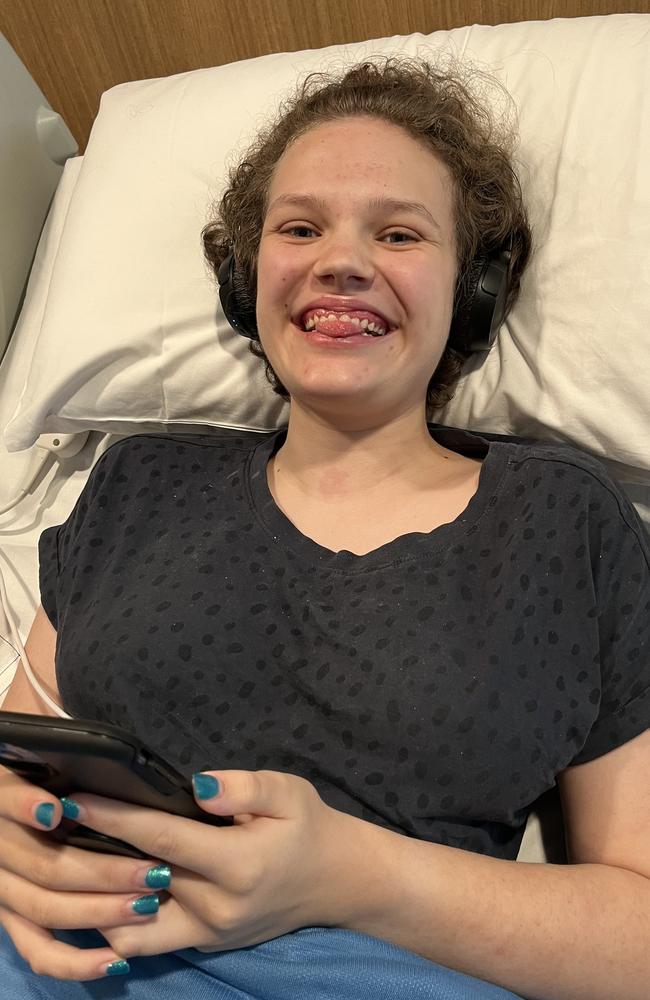Mum’s panic after non-verbal immobile daughter faces premature hospital discharge
This time last year, Chelsea Speirs was a thriving teen working hard to become an astrophysicist. Now she can hardly talk or walk.

Instant panic rocked mum Meredith Speirs last week when she was told her daughter was to be discharged from hospital despite her medical condition not improving.
Sixteen-year-old Chelsea was diagnosed in June last year with Functional Neurological Disorder (FND) after contracting a gastro bug, and has since lost her speech and almost all mobility.
It was on February 16 this year, during a physical therapy session, she lost what remained of the strength she had, and had to rely on her parents and nurses for around-the-clock care.
She has been receiving treatment at Hornsby Hospital in Sydney’s north with two staff supporting her needs, and requires help with eating, using the bathroom and bathing, among other things.
So when Mrs Peirs was told on Friday the hospital would be going ahead with discharging Chelsea, immediately she was left facing the impossible question: “How am I going to do this?”

Chelsea’s team of carers had previously planned for her to go home on Wednesday last week but her family thought, given she recently battled an additional infection and had made no progress, her discharge would be paused.
“I’m like, ‘OK, how do we do this if it’s taking two nursing staff to help with her daily care, how do we do that at home?’,” she told news.com.au.
The stressed mum refused the Wednesday discharge and it was pushed back to Friday – still far too soon, with a subsequent meeting with a head of department deciding she would be sent home on Monday this week.
While the hospital offered the family a bed and hoist to take home, no further resources were available. The prospect was further strained by an old back injury that prevented Mrs Speirs from being able to manoeuvre Chelsea, who also lives with autism, on her own.
In an desperate eleventh hour plea for help, Mrs Speirs posted the family’s dilemma to social media and ultimately gained the support of Treasurer and Hornsby MP, Matt Kean.
Mr Kean’s office then spoke with Hornsby Hospital’s general manager, Simon Hill, who has since facilitated the extension of Chelsea’s care and linked her family with a dedicated patient representative.
A spokesperson for the Northern Sydney Local Health District told news.com.au Chelsea will remain in hospital.
“Hornsby hospital staff have been working closely with the family to ensure Chelsea
receives the right care in the right setting,” the spokesperson said.
“A patient’s ongoing admission to hospital is based on their clinical condition and they are
only discharged from hospital when it is clinically safe to do so.
“After discussion with her family, Chelsea will remain in hospital to allow hospital staff to
help the family access the necessary support services under the National Disability
Insurance Scheme so she can receive ongoing care in the comfort of her own home
when it is appropriate.”
Mrs Speirs, who has been unable to work during her daughter’s illness, has been battling to have Chelsea’s FND diagnosis categorised as her primary disability with the NDIS, with the hope it would allow for funding.

“There’s an issue with FND being classed as a primary disability under the NDIS because it’s not always classed as a permanent disability, so that’s what I’m trying to fight for,” Mrs Speirs said.
“She’s had it for more than six months and we’ve done most of the therapies to help her but haven’t had any success.”
Chelsea will require ongoing access to carers and other mobility supports like a wheelchair for an unknown length of time, which was another challenging factor facing the family.
“Ultimately we don’t know when or if she’s going to get better … for Chels, we’ve never made any improvement, we’ve only declined,” she said.
According to a 2019 report commissioned by the National Mental Health Commission, just 10 per cent of NDIS applications from people with FND were successful, with 20 per cent of survey respondents saying they had been rejected.
The primary reason people were knocked back was difficulty determining whether or not FND was a permanent condition.
Prior to contracting the bug and being diagnosed with FND, Chelsea attended a mainstream school, took gym class and worked hard towards her long-term goal of becoming an astrophysicist.

Even since being admitted to hospital, her mum said she had maintained an optimistic outlook towards recovery, which had initially been bolstered by being told she would be back to normal in a few weeks.
“In some respects that’s what you have to say, but it’s very hard when that’s what you’re told and that doesn’t happen and you’re making any improvement,” Mrs Speirs said.
While she has reduced her Year 11 school workload, with her parents’ help she has been able to continue with two subjects by using her phone and the touchpad on her laptop.
Her most recent decline however had crushed her.
“It was the first time I’d really seen her upset and scared about what was going on. She was crying and wanted me to hug her, which she doesn’t normally do,” her mum said.
Mrs Peirs said it had been “so hard” watching her daughter repeatedly decline but knew “falling in a heap” simply wasn’t an option.
“She’s got all these dreams and I want to help her achieve them. She’s 16 and she’s been in bed for eight weeks,” she said.
A GoFundMe has been established to source the right equipment and support so Chelsea can continue her treatment safely at home.
Keep the conversation going, email brooke.rolfe@news.com.au






